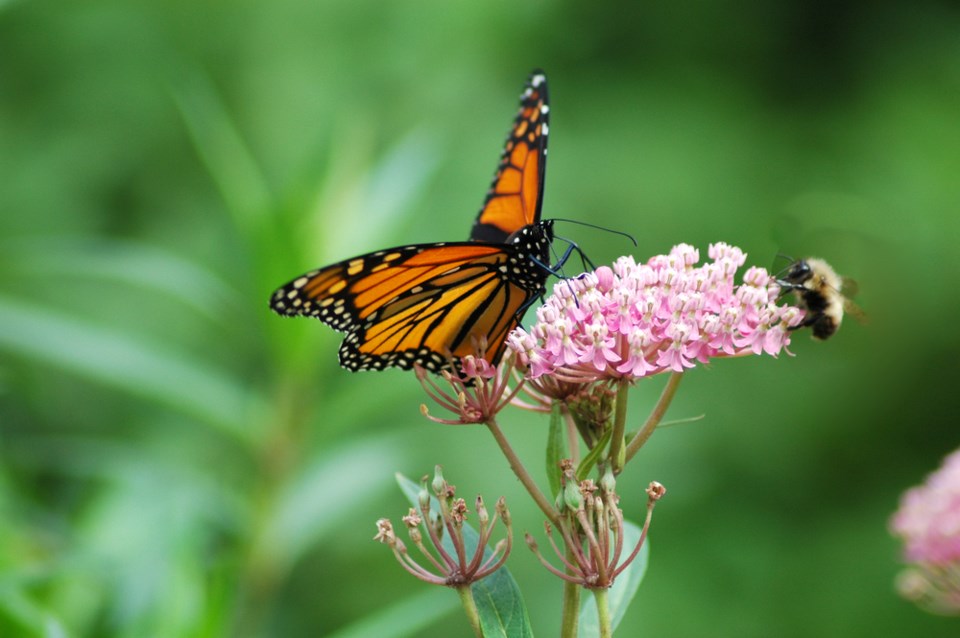Known for its incredible ability to migrate hundreds of miles, the Monarch butterfly, Danaus plexippus, has suffered from population decline in recent years. As of last year, the U.S. Fish & Wildlife Services estimated that the Monarch population had plummeted by 90% over the previous 20 years. Studies seem to indicate populations increased some last year, but there is still a great deal of work to be done if this species is to be preserved.
Monarch Butterflies Need Milkweed
Monarch butterflies lay their eggs only on milkweed plants—because their caterpillars only eat milkweed plants (Asclepias spp.). The problem is that milkweed is on the decline, leaving our Monarch butterflies with an increasingly limited food supply. Scientists believe this to be one of the causes of the population decreases.
The solution? Buy Milkweed for your yard!
This year, the Spring Plant Sale at Heard Natural Science Museum & Wildlife Sanctuary will feature a huge selection of native milkweed plants. Species available for purchase will include Asclepias brachystephana, Asclepias incarnata, Asclepias texana, Asclepias oenotheroides, Asclepias asperula capricornu, Asclepias arenaria and Asclepias asperula asperula. By purchasing and planting milkweed to help feed Monarch butterfly caterpillars, North Texans will be able to help the recovery of this species, while at the same time also support the Heard Natural Science Museum, a private 501(c)(3)nonprofit organization. A representative from Monarch Watch will be available during much of the sale to answer your questions about Monarchs. This sale will also feature native flowering plants that provide nectar for the adult butterflies.
The Spring Plant Sale at Heard Natural Science Museum & Wildlife Sanctuary
For more than 20 years, veteran and novice gardeners alike have anticipated this rare opportunity to purchase plants from a huge selection of native plants, hard-to-find herbs and well-adapted plants at Heard Natural Science Museum & Wildlife Sanctuary’s annual Spring Plant Sale. This year, the Heard will provide some of the best plants for North Central Texas gardens and an opportunity to obtain many rare plants.
The plant sale will be open to the public on April 16 from 9 a.m. to 5 p.m. and April 17 from 1 p.m. to 5 p.m. A Heard Museum Member Pre-Sale will be offered on April 15 from 4–7 p.m. The Member Pre-Sale is open to Heard Museum members only; however, memberships will be available for purchase at the event or online beforehand. Due to overwhelming support last year, the plant sale sold out early making the Member Pre-Sale all the more advantageous for Heard Museum members.
There are a number of other benefits to using native plants in landscaping. Using these plants that are naturally suited to Texas’ hydrologic issues is an excellent way to reduce reliance on supplemental watering. Many of the native plant species are also better suited to Texas’ climate and provide food sources and habitat for many kinds of wildlife.
All purchases made will be tax free and proceeds from this fundraising event benefit Heard Natural Science Museum & Wildlife Sanctuary. Guests are welcome to bring carts or wagons to facilitate their purchases.
When:
- April 15 from 4–7 p.m. (Heard Museum Member Pre-Sale)
- April 16 from 9 a.m. to 5 p.m.
- April 17 from 1 p.m. to 5 p.m.
Where: Heard Natural Science Museum & Wildlife Sanctuary, 1 Nature Pl., McKinney, Texas 75069
Heard Natural Science Museum & Wildlife Sanctuary
The Heard was founded in 1967 by Bessie Heard. Miss Heard was 80 years old when she saw the need to preserve a place where future generations could experience nature. Today, the Heard’s mission of bringing nature and people together to discover, enjoy, experience, restore, and preserve our priceless environment is carried out through education, particularly of young people, which emphasizes an appreciation of nature and its conservation.
For more information, visit heardmuseum.org.




